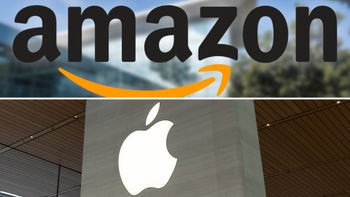Apple and Amazon face $218 million fine over anti-competitive deal in Spain

Big companies often find themselves entangled in legal issues and require skilled lawyers to handle the onslaught of lawsuits. Currently, Apple and Amazon are jointly facing a $218.03 million fine.
As reported by Reuters, Spain's antitrust watchdog, the National Commission for Markets and Competition, has imposed fines on both Amazon and Apple for colluding to limit the sale of Apple products exclusively to Apple-authorized resellers in Spain. Apple faces a fine of 143.6 million euros (≈$161 million), while Amazon receives a fine of 50.5 million euros (≈$57 million).
The companies have a two-month period to appeal the decision, and spokespeople from Apple and Amazon have separately stated that their respective companies intend to appeal, so nothing is decided yet.
Back in 2018, the trouble began when Apple and Amazon struck a deal to limit the sale of Apple and Beats products exclusively to Apple-authorized resellers. This agreement had a global impact, applying in the US, UK, France, Germany, Italy, Spain, Japan, and India, ultimately leading to the establishment of an official Apple Store on Amazon.
Spain's antitrust watchdog claims that over 90% of the retailers using Amazon's marketplace to sell Apple devices were stopped after the two companies made their deal. According to the regulator, Amazon also limited the access of retailers from the European Union outside Spain to reach Spanish customers. It also restricted the advertising of Apple's competitors on its website when users searched for Apple products. As a result of the agreement, the prices of Apple devices sold online went up in Spain.
However, according to Reuters, Apple claims that the agreement with Amazon aimed to reduce the sale of counterfeit products online. Before this deal, Apple had to spend significant money and effort to send numerous "take-down" notices to stop the sale of fake devices.
An Amazon spokesperson responded to Spain's antitrust regulator suggestion, stating that Amazon doesn't benefit from excluding sellers from its marketplace. The spokesperson emphasized that Amazon's business model relies on the success of the companies selling through Amazon. Moreover, the company asserted that customers gained advantages from the 2018 agreement, as they enjoyed more product listings and significant discounts on iPads and iPhones.
Spain is not alone in seeking to penalize the 2018 agreement between Amazon and Apple. Italy's antitrust regulator also fined the US tech giants, alleging anti-competitive behavior in the sale of Apple and Beats products. The fine amounted to $130.04 million for Apple and $65.8 million for Amazon. However, the Italian administrative court later overturned the fine imposed by the country's antitrust authority on the two companies.
In 2020, both Amazon and Apple came under German antitrust scrutiny due to a policy that excluded independent sellers of brand products from the online marketplace. This scrutiny was related to the same 2018 deal between the two companies.
Only a month ago, a class-action lawsuit, initially filed in November of the previous year, alleged that Apple and Amazon collaborated to artificially raise the prices of iPhones and iPads sold on Amazon. US District Judge John Coughenour recently approved the lawsuit, indicating that Apple and Amazon now confront comparable allegations made in Europe concerning the 2018 deal in the United States too.
As reported by Reuters, Spain's antitrust watchdog, the National Commission for Markets and Competition, has imposed fines on both Amazon and Apple for colluding to limit the sale of Apple products exclusively to Apple-authorized resellers in Spain. Apple faces a fine of 143.6 million euros (≈$161 million), while Amazon receives a fine of 50.5 million euros (≈$57 million).
How it all began?
Back in 2018, the trouble began when Apple and Amazon struck a deal to limit the sale of Apple and Beats products exclusively to Apple-authorized resellers. This agreement had a global impact, applying in the US, UK, France, Germany, Italy, Spain, Japan, and India, ultimately leading to the establishment of an official Apple Store on Amazon.
The two contracts, signed on October 31, 2018, granted Amazon the status of an authorized Apple dealer. However, according to Spain’s antitrust watchdog, these contracts also contained anti-competitive clauses that significantly impacted the online market for electronic devices in Spain.
Spain's antitrust watchdog claims that over 90% of the retailers using Amazon's marketplace to sell Apple devices were stopped after the two companies made their deal. According to the regulator, Amazon also limited the access of retailers from the European Union outside Spain to reach Spanish customers. It also restricted the advertising of Apple's competitors on its website when users searched for Apple products. As a result of the agreement, the prices of Apple devices sold online went up in Spain.
What do Apple and Amazon say about the matter?
However, according to Reuters, Apple claims that the agreement with Amazon aimed to reduce the sale of counterfeit products online. Before this deal, Apple had to spend significant money and effort to send numerous "take-down" notices to stop the sale of fake devices.
Where else are Apple and Amazon facing legal tangles?
Spain is not alone in seeking to penalize the 2018 agreement between Amazon and Apple. Italy's antitrust regulator also fined the US tech giants, alleging anti-competitive behavior in the sale of Apple and Beats products. The fine amounted to $130.04 million for Apple and $65.8 million for Amazon. However, the Italian administrative court later overturned the fine imposed by the country's antitrust authority on the two companies.
In 2020, both Amazon and Apple came under German antitrust scrutiny due to a policy that excluded independent sellers of brand products from the online marketplace. This scrutiny was related to the same 2018 deal between the two companies.
Only a month ago, a class-action lawsuit, initially filed in November of the previous year, alleged that Apple and Amazon collaborated to artificially raise the prices of iPhones and iPads sold on Amazon. US District Judge John Coughenour recently approved the lawsuit, indicating that Apple and Amazon now confront comparable allegations made in Europe concerning the 2018 deal in the United States too.










Things that are NOT allowed: